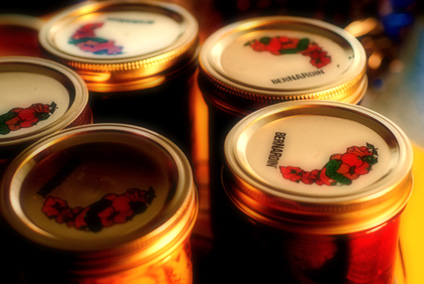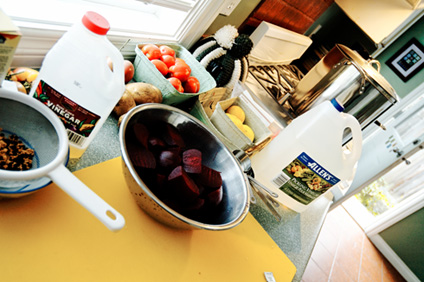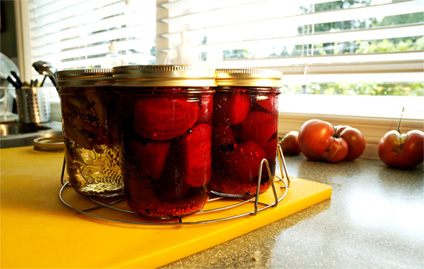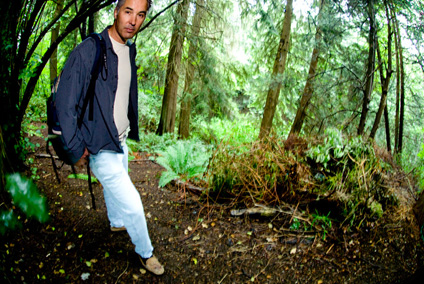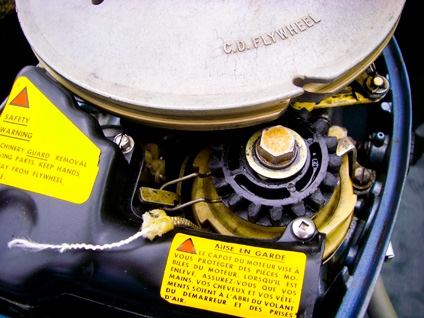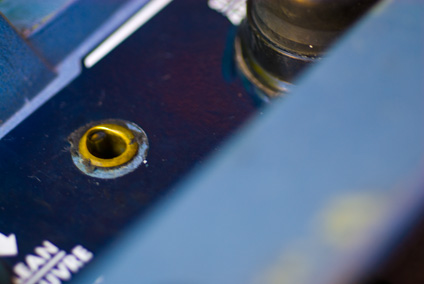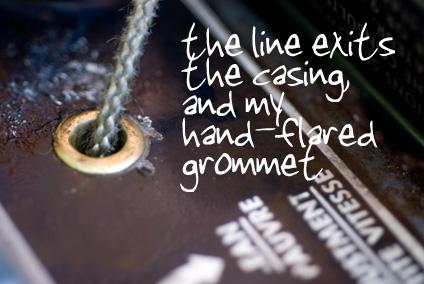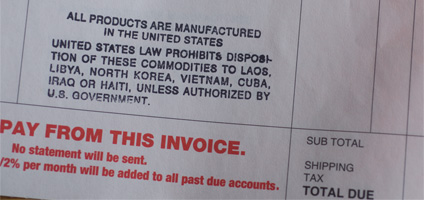Video: Sea Dragon Charters – scuba dive Howe Sound / Vancouver BC. http://bit.ly/1OAufB #diving #scuba
Monthly Archives: August 2009
Twitter Tools Test
sorry . please ignore my lame testing.
Clean Hot Peppers [pic] http:/…
Clean Hot Peppers [pic] http://ff.im/7jQWW
Encore with the Test
my super bahd. please ignore this – i’m STILL testing – sorry to be some a lame-o.
Canning is Sexy – http://bit.l…
Canning is Sexy – http://bit.ly/UhmDx
Canning Is Sexy
I gotta say.
Taking fresh organic vegetables out of the garden in the morning, and by early afternoon seeing them transformed into beautiful jars of food we can eat months from now, is, well…
Super.Hot.
And knowing that they’ll taste ten times better than anything I’m going to find in the supermarket, is well…
Really.Really.Super.Hot.
All that’s involved is:
- a little simple chemistry with water, vinegar, sugar & salt.
- some spices and seeds (like mustard) for taste.
Way back, when I first tried making pickles and other canned goodies, I used to phone my grandma or my mom for advice.
Today, I just have to lean over the counter to the keyboard and Bing!, within seconds I’ve got dozens of detailed, step-by-step instructions on how to make the very best [name your preserve] EVER!
It’s like having an entire old folks home full of grandmas at your disposal – even better since almost all come with reviews by people who’ve tried them.
The other thing is, this canning stuff doesn’t have to take over your life. You can easily put up just a few jars without turning your life (and your kitchen) into a cannery. Crank up the tunes, turn the burner up high, and go for it.
Today, for instance, I did 4 jars pickled beets, and 1 of picked jalapeno peppers.
Now that’s sexy.
Ok, maybe my excitement has a tiny bit to do with the fact that I’m still recovering from septicemia.
But still. I haven’t been this excited since EB showed me her…
Well, never mind.
(cross posted to VanGoGreen)
Good to Grow – Author Podcast

Author David Tracey has a new, 6-part series of articles about urban agriculture, currently running in the The Tyee.
The series is called Good to Grow: Raising Food in BC’s Cities.
I recently sat down with David to find out more about the series…
Runs: 11:08
![]()
podcast ISBN: 978-1-926758-02-2
podcast and photo © Bigsnit Media Consulting Inc.
- David Tracey’s website: DavidTracey.ca
- David is the author of Guerrilla Gardening: A Manualfesto
- Good to Grow, a 6-part series in TheTyee.ca
Cold, Dark and Snap
We went out for an evening sail a few nights ago – a pretty big change in weather from even just a few days ago.
It was cool and threatening rain, and despite the weather office removing the wind warning, it was still gusty with lots of chop.
Our friends didn’t seem to mind – they were just happy to be out on a sailboat an d with Madsu’s main reefed and the 100% jib hanked on, we were making pretty good progress to weather.
We were the only sailboat out and tacked across from West Van to Bowen a couple of times.
I figured we should head in before it got too dark and colder. Reaching along the West Van shore near Whytecliff Park I decided to drop the jib and sail under main alone. It was now pretty much dark, and I dumped the main and lowered the motor to take us home.
Just as I pulled on the recoil cord to start the outboard, the cord snapped, right near the handle. It must have been really frayed as the pull didn’t even turn the motor over, and here I was with the pull start handle in my hand, the sails down, and the motor not running.
Fortunately, we had done a few things right. When I’m sailing solo I always give myself lots of room and lots of time to get stuff done, and even though I had crew last night, I’d done the same.
We were 2 or 3 cables off the shore, so had a bit of sea room – lots of time to get the sails back up if necessary. We also were not on a lee shore. Horseshoe Bay is a busy ferry terminal and I always raise and douse sails well away from the ferry track. I was glad I had done so tonight, as I looked out into the dark to see the Bowen Ferry approaching.
I popped the lid on the outboard and realized I couldn’t really see too much in the dark, and wasn’t too thrilled with the idea of trying to fiddle with the recoil line in a sloppy chop. The Evinrude has a great big flywheel up top, and sure enough, it’s got a groove built-in for wrapping a line.
The groove is quite narrow – probably the same as the recoil line itself which I learn later is 5/32″ line – and I don’t have anything that small on the boat. I did manage to find a couple of feet of 1/4″ line in my skipper bag, and though it was barely recessed in the groove slot, I was able to wrap it ONCE around the flywheel.
One pull.
Two pulls.
With only one wrap around the flywheel, I’m not getting much momentum, but the motor is a notoriously good starter, so I figure it’s going to fire.
Should I choke and risk flooding it?
Sure, let’s choke.
Choke.
One more pull. Choke Off.
Pull. She fired right up, and we motored in without further mishap.
It was a good lesson though. I’m always pretty cautious when dousing sails and motoring up to get to the moorage. I’ve been caught on a lee shore before, and it isn’t anything I ever want to repeat, so I tend to give myself a lot of room – I was glad I did on this night.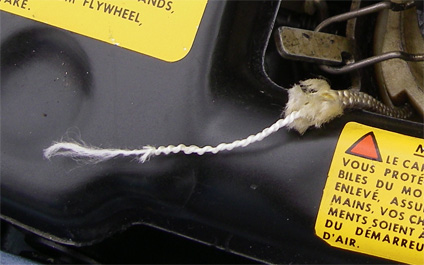
No matter how well maintained your vessel – things break. I keep Madsu is top shape, and since the outboard had been serviced in the spring, including a new recoil line, this caught me totally unawares.
What I didn’t realize is that the recoil line was chafing against the casing – there is a soft metal sleeve or grommet to keep chafe down, but it had worn through and the line was slowly cut through from friction against the casing. I now have an emergency line of the right width in my bag, in case I have to use the flywheel to start up again.
Finally, I was grateful for a motor that starts well, and another good reason to keep it serviced and running properly.
This is the grommet meant to protect the recoil line as it passes through the motor casing. It’s soft metal, brass I think.
You can see how it’s worn away in one spot – that’s because of the extreme angle required to pull the line when the motor is down and in the water. The starter handle sits tight against this grommet when the line is attached and I hadn’t noticed how it had worn right through. Every pull was cutting through the line.
The Repair:
I did get a new grommet from Lorship Marine on Victoria Drive. It’s essentially a tube, pre-flared at one end. You insert it from the inside of the motor casing, then hand flare the outside. 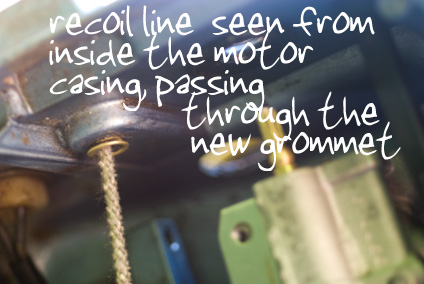
Once I’d cut out the old grommet, I had to remove part of the carb in order to be able to insert the grommet through the casing.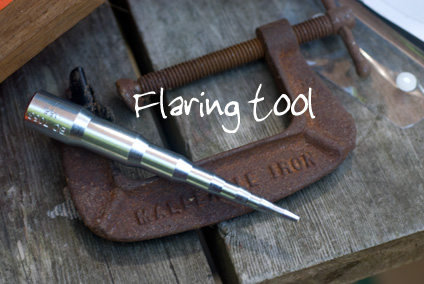
Then I had to flare the tube on the outside – I found a flaring tool at Home Depot which got things started ok, then finished off withe some gentle work with the ball peen hammer. I had to jam a piece of hardwood in to support the inside end of the grommet while I flared the outside. The flaring tool did an excellent job of getting a nice consistent shape to the start of the flare, and with some light touches with the hammer, I was able to get a really nicely shaped grommet by the end of it.
I had taken the motor off the boat and worked on it at home. It would have been a really difficult job with the motor still on the boat, so I was glad I was able to do the repair here, as opposed to while out cruising.
Cuba, You’re Better Off Without Them
I finally got around to sending two of my wireless mic/transmitters in for repair.
I have had these two Comtek rigs sitting in a cupboard for a year – neither of them is very old or even used that much, but they both went on the fritz and I’d literally shelved them in favour of buying vastly superior Lectrosonic gear (which is also much more expensive).
Not that the Comtek rigs were cheap by any stretch of the imagination, so given that they represented a substantial investment and were useless as is, I finally decided to send them away to be fixed.
Comtek’s head office is in Salt Lake City, Utah, and was very efficient in dealing with them. They fixed and sent them back within a couple of weeks (and almost 300 dollars USD in repair costs, plus shipping, plus brokerage fees).
The receipt that came with them caught my attention – not because of the dollar amount – but because of the reminder of the US of A’s embargo on Cuba and other countries…
And I couldn’t help but think:
“Cuba, you’ve got enough problems. In this case, they’re actually doing you a favour.
Really. You are much better off without this brand of American technology”
Please make it stop #cbc. Vin…
Please make it stop #cbc. Vinyl Cafe doing covers – it’s like D. Finkleman on valium. Back to News 1130 for me.
Vancouver Chinatown Festival […
Vancouver Chinatown Festival [pic] http://ff.im/6lotL
Great to see so many cops and …
Great to see so many cops and firefighters from other countries wandering around Vancouver, here for their games. Lots of big moustaches…
Watching the Coke Zero street …
Watching the Coke Zero street team at the Vancouver Chinatown Festival made me tired. Why do they have to be so annoyingly perky ?
Dragon Rickshaw Adventure [pic…
Dragon Rickshaw Adventure [pic] http://ff.im/6lfTw
BC Libs in full ‘sell hst’ mod…
BC Libs in full ‘sell hst’ mode, saying best thing for unemployment is HST. Nxt they’ll be telling us it’s good for preventing forest fires.
Sadly, maybe we need guard rai…
Sadly, maybe we need guard rails on rock n roll catwalks for geriatric front men ? Steve Tyler takes a tumble –> http://bit.ly/BJHLA
Making Buffalo style chicken w…
Making Buffalo style chicken wings for dinner – makes me feel like I’m in Ontario just saying that. Hot x 3 with a nice cold one coming up
booked this gig: Livent’s Gar…
booked this gig: Livent’s Garth Drabinsky sentenced to 7 years in prison for fraud. His partner Myron Gottlieb gets six. via CKNW radio.
Will That Be Cash or Trust ?
Spring Gillard and David Tracey have released the latest in their series of podcasts, Can Urban Agriculture Save the World?
A bit of serendipity was involved with this one.
While on their way to interview Cam MacDonald in Mt. Pleasant, they passed a small corner store. Taking a peak inside they discovered a very unusual city corner store – packed with local products and oozing country charm.
It’s called the Home Grow-in Grocer, and it’s a place where trust trumps the credit card…
Runs 10:28
Podcast ISBN: 978-1-926758-01-5
photos and podcast © Robert Ouimet & Bigsnit Media 2009
[kml_flashembed publishmethod=”static” fversion=”8.0.0″ movie=”http://www.snitcast.com/slideshows/podcasts/podcast_belli-kb.swf” width=”424″ height=”305″ targetclass=”flashmovie”]
[/kml_flashembed]
The Home Grow-In Grocer is at 196 West 18th in Vancouver.
The owner Colleen refers to in the interview is Deb Reynolds.
cross posted to VanGoGreen
At YVR Air Canada takes over 4…
At YVR Air Canada takes over 45 min. to deliver bags from a 2 hr. flight from wpg. They were sending 5 bags at a time, then smoke break?
Sunflower [pic] http://ff.im/6…
Sunflower [pic] http://ff.im/68yxM
